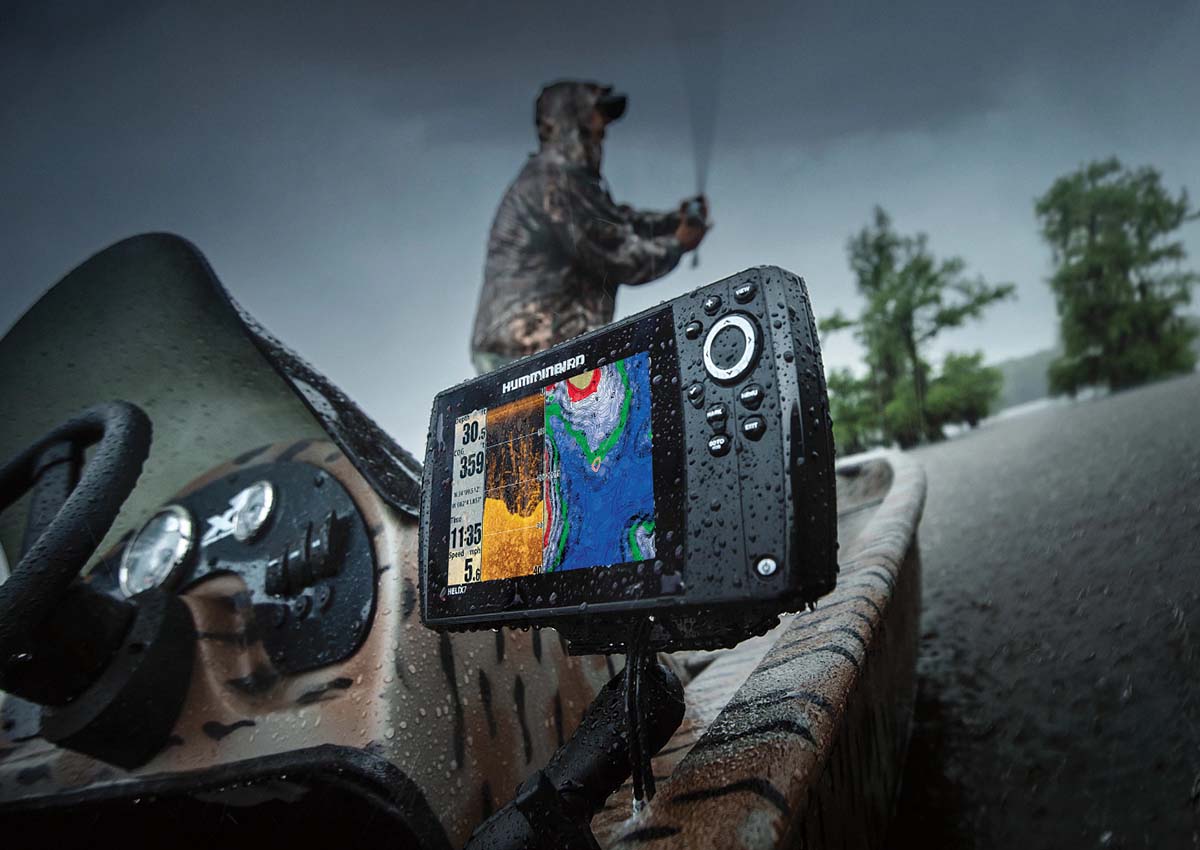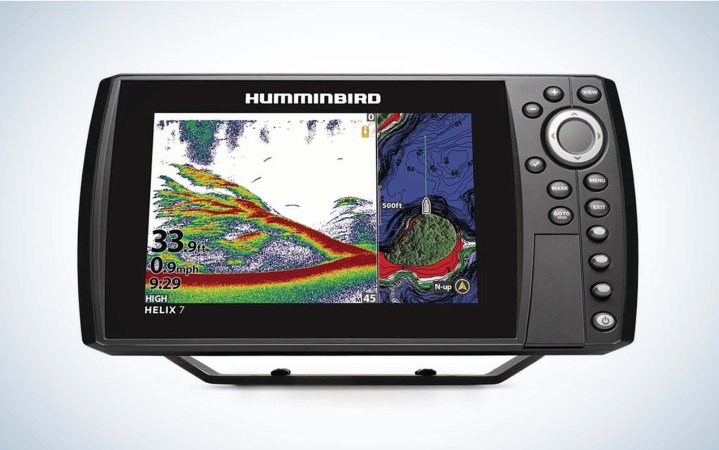We may earn revenue from the products available on this page and participate in affiliate programs. Learn More ›
Today’s fish finders and marine mapping systems are light-years ahead of those available just a few years ago, and in some cases, the pricing matches those advances. I’ve often simultaneously lamented and laughed at the fact that the mounting bracket for a graph on my most recent boat cost more than the entire electronics setup on my first bass boat in 1996.
Of course, there’s a sweet spot of value where the X and Y axis of price and functionality meet. It varies for every angler, depending on your budget, the waters you fish, the species you’ll chase, and the number of screens you intend to have on your boat. While some top pros use five or six big screens on their boats—up to three on the console and bow—most weekend anglers can only justify a total of two. One sits on the front for use when running the trolling motor and one goes on the console for when you’re behind the steering wheel.
Humminbird’s Helix 7 CHIRP MSI GPS G4N may have a comparatively small screen by modern standards, but it packs many features into that space. Here’s what I think of this value fish finder.
Humminbird Helix 7 CHIRP MSI GPS G4N Features and Specs
- High-definition 7-inch screen
- Screen can be split into multiple views and functions
- CHIRP
- MEGA Down Imaging
- Side imaging
- Internal GPS
- Built-in mapping
- Auto-chart feature
- Easy-to-use keypad
- NMEA built-in networking system
- 1-year warranty
Keypad Control
The Helix uses a keypad to jump between views and it can be set up with quick access buttons for your most used views.
Internal GPS and Humminbird Basemap
The Humminbird Basemap includes charts for more than 10,000 lakes and coastal coverage for the continental U.S. The maps identify buoys, day markers, hazards, marinas, contours, depth markers, and more. Maps are also upgradable to Navionics, LakeMaster, and CoastMaster charts.
One-Boat Network Compatible
The Helix 7 integrates and communicates with other Humminbird and Minn Kota products.
Ethernet Networking
High-speed Ethernet allows you to connect multiple fish finders, or upgrade to add-on technologies like Minn Kota i-Pilot Link and Humminbird CHIRP Radar.
Read Next: How to Read a Fish Finder
Testing the Humminbird Helix 7 CHIRP MSI GPS G4N in the Field

I’ve run various Humminbird units for several years, primarily 9- and 12-inch models from Generation 2 and Generation 3. The former has just down-imaging, the second adds side-imaging. Since I typically run matching models front and rear, I want something where I can split the screen—say, mapping on one side and two-dimensional sonar or side-imaging on the other, so I can mark key spots. To be completely honest, I got used to the 12-inch screen and the detail that it provided, and was worried that a 7-inch screen would tax my aging eyes.
Remarkably, I found the pictures to be extremely crisp and easy to view. Although in split screen you’ll give up detail and field of view
If you want to add this as another screen, front or back, to be used for a single purpose such as mapping, I wholeheartedly recommend this size. It’s all you need unless you’re fishing offshore for hundreds of thousands of dollars. For purposes of this review, however, I’m assuming it will be your lone graph at the bow or console, asked to do everything, possibly all at once.
Read Next: Best Fish Finders
What the Humminbird Helix 7 CHIRP MSI GPS G4N Does Best
There are two things I really liked about the Helix 7 that were consistent with my experiences with the company’s larger units from past generations. The first was their mapping. Even without an additional map chip, the base map is very detailed and remarkably accurate for most bodies of water, and it updates and adjusts frequently. That’s critical, especially on new waters where navigation may be perilous, but also on familiar fisheries where I’m constantly looking for the slightest performance edge. The second was the electronics menus. I’m 53 years old, hardly a “techie,” and I don’t exhaustively read the manual. Nevertheless, I could find and do everything I wanted without phoning a friend, going back to the manual, or consulting YouTube. That’s a huge plus.

This is about as inexpensive a unit as you can get that still has side-imaging. I fish a lot of tidal rivers with shallow, mucky bottoms and mostly visible cover, so for a long time I resisted the siren’s call of SI. That was a mistake. Once I dialed in the color palettes, distance settings, and sensitivity that I needed for my purposes, it allowed me to break down water faster than any other tool in my boat. If you’re convinced that you don’t need it, you can get a DI version with a larger screen for approximately the same price. However, the only con of SI is that you can get stuck behind the screen looking for more secret structure rather than actually fishing.
I also like being able to put two-dimensional sonar and down-imaging side-by-side to see slight differences. Often the two didn’t differentiate what I was seeing in a meaningful way, but it happened just often enough to add a few more fish in the course of a season.
Where the Humminbird Helix 7 CHIRP MSI GPS G4N Can Improve
If you’re planning to use side-imaging, down-imaging, and mapping all at the same time, this is not the unit for you. You’re asking to do too much with too little real estate. Spend the extra money and get another screen, or a larger screen. I prefer this as a single purpose unit, but often use it to do two things at a time. I just have to focus a bit harder than if I was using the 12-incher.
My Humminbirds were mounted on standalone brackets, and I did find that sometimes in really rough water a wire would come loose. That may have been user error, and it’s easy enough to fix, but it was a slight annoyance. Then again, they were easier to install, especially in the dark, than some other brands.
Final Thoughts
Remember that when setting a budget for marine electronics, the price of the “head,” mounting hardware, and transducer may not be everything involved. By the time you add in mapping chips, gimbal mounts, and other accessories, it’s amazing how much the bill can skyrocket. Nevertheless, straight out of the box, the Humminbird is ready to fish at a high level.
The then-state-of-the-art graph I purchased 25 years ago was black and white, two-dimensional, with no mapping and only a fraction of the detail that this model offers. The Helix 7 is easy to learn, easy to use, and won’t break the bank. Just don’t ask it to do everything at once, and you’ll be thrilled with what you got, and thrilled at the money you saved over larger models.

